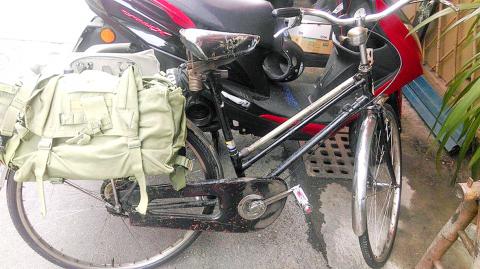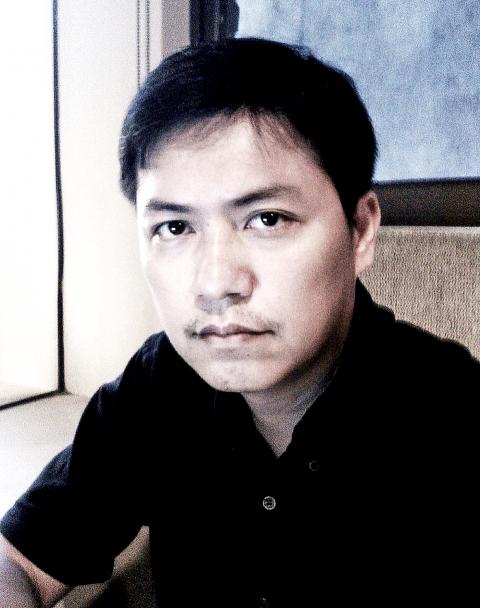Novelists usually pursue fame and book sales through publicists, book fairs and social media, but Wu Ming-yi’s (吳明益) approach has been far from typical. The novelist and academic spent the summer holiday riding an antique bicycle around Taiwan, meeting fans and giving lectures at small, independent bookstores to promote his book, The Stolen Bicycle (單車失竊記).
“People appreciate the opportunity to connect with me more intimately in these small spaces,” Wu told a standing-room-only audience at Tainan’s Lingo Bookstore (林檎二手書室). He added that he was a marketing major in college, and it was ironic that he chose to go against everything he learned about marketing and promotion.
Wu says he enjoys sharing the knowledge that he learned about Taiwan’s flora and fauna in his research papers, and started building a following that appreciated his message of ecological conservation. Eventually, he began toying with the introduction of creative fiction to enhance his message, and his career as a novelist developed.

Photo: Tony Coolidge
The novel, inspired by his love for bicycles and Taiwanese history, brings readers back to a simpler time when life moved more slowly and people spent more time face-to-face with friends and neighbors. Riding a bike allowed people to appreciate and digest the details of the world around them.
Wu said that success growing a fan base in Taiwan was not easy until he partnered with a talented literary agent and translator who helped him generate success overseas.
Although Wu shunned modern marketing and choose a grueling, sweaty book promotion schedule at small venues around the nation, the whole experience furthered his reputation as an approachable man who preferred to have a meaningful discussion over coffee rather than take a selfie with a fan. And Wu seems committed to enduring more heat and sweat to make sure more people get it.

Photo courtesy of Wu Ming-yi

Nov. 11 to Nov. 17 People may call Taipei a “living hell for pedestrians,” but back in the 1960s and 1970s, citizens were even discouraged from crossing major roads on foot. And there weren’t crosswalks or pedestrian signals at busy intersections. A 1978 editorial in the China Times (中國時報) reflected the government’s car-centric attitude: “Pedestrians too often risk their lives to compete with vehicles over road use instead of using an overpass. If they get hit by a car, who can they blame?” Taipei’s car traffic was growing exponentially during the 1960s, and along with it the frequency of accidents. The policy

Hourglass-shaped sex toys casually glide along a conveyor belt through an airy new store in Tokyo, the latest attempt by Japanese manufacturer Tenga to sell adult products without the shame that is often attached. At first glance it’s not even obvious that the sleek, colorful products on display are Japan’s favorite sex toys for men, but the store has drawn a stream of couples and tourists since opening this year. “Its openness surprised me,” said customer Masafumi Kawasaki, 45, “and made me a bit embarrassed that I’d had a ‘naughty’ image” of the company. I might have thought this was some kind

What first caught my eye when I entered the 921 Earthquake Museum was a yellow band running at an angle across the floor toward a pile of exposed soil. This marks the line where, in the early morning hours of Sept. 21, 1999, a massive magnitude 7.3 earthquake raised the earth over two meters along one side of the Chelungpu Fault (車籠埔斷層). The museum’s first gallery, named after this fault, takes visitors on a journey along its length, from the spot right in front of them, where the uplift is visible in the exposed soil, all the way to the farthest

The room glows vibrant pink, the floor flooded with hundreds of tiny pink marbles. As I approach the two chairs and a plush baroque sofa of matching fuchsia, what at first appears to be a scene of domestic bliss reveals itself to be anything but as gnarled metal nails and sharp spikes protrude from the cushions. An eerie cutout of a woman recoils into the armrest. This mixed-media installation captures generations of female anguish in Yun Suknam’s native South Korea, reflecting her observations and lived experience of the subjugated and serviceable housewife. The marbles are the mother’s sweat and tears,